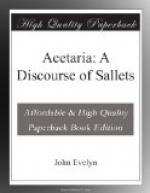19. Cresses, Nasturtium, Garden Cresses; to be monthly sown: But above all the Indian, moderately hot, and aromatick, quicken the torpent Spirits, and purge the Brain, and are of singular effect against the Scorbute. Both the tender Leaves, Calices, Cappuchin Capers, and Flowers, are laudably mixed with the colder Plants. The Buds being Candy’d, are likewise us’d in Strewings all Winter. There is the Nastur. Hybernicum commended also, and the vulgar Water-Cress, proper in the Spring, all of the same Nature, tho’ of different Degrees, and best for raw and cold Stomachs, but nourish little.
20. Cucumber, Cucumis; tho’ very cold and moist, the most approved Sallet alone, or in Composition, of all the Vinaigrets, to sharpen the Appetite, and cool the Liver, [16]_&c._ if rightly prepar’d; that is, by rectifying the vulgar Mistake of altogether extracting the Juice, in which it should rather be soak’d: Nor ought it to be over Oyl’d, too much abating of its grateful Acidity, and palling the Taste from a contrariety of Particles: Let them therefore be pared, and cut in thin Slices, with a Clove or two of Onion to correct the Crudity, macerated in the Juice, often turn’d and moderately drain’d. Others prepare them, by shaking the Slices between two Dishes, and dress them with very little Oyl, well beaten, and mingled with the Juice of Limon, Orange, or Vinegar, Salt and Pepper. Some again, (and indeed the most approv’d) eat them as soon as they are cut, retaining their Liquor, which being exhausted (by the former Method) have nothing remaining in them to help the Concoction. Of old they [17]boil’d the Cucumber, and paring off the Rind, eat them with Oyl, Vinegar, and Honey; Sugar not being so well known. Lastly, the Pulp in Broth is greatly refreshing, and may be mingl’d in most Sallets, without the least damage, contrary to the common Opinion; it not being long, since Cucumber, however dress’d, was thought fit to be thrown away, being accounted little better than Poyson. Tavernier tells us, that in the Levant, if a Child cry for something to Eat, they give it a raw Cucumber instead of Bread. The young ones may be boil’d in White-Wine. The smaller sort (known by the name of Gerckems) muriated with the Seeds of Dill, and the Mango Pickle are for the Winter.
21. Daisy, Buphthalmum, Ox-Eye, or Bellis-major: The young Roots are frequently eaten by the Spaniards and Italians all the Spring till June.
22. Dandelion, Dens Leonis, Condrilla: Macerated in several Waters, to extract the bitterness; tho’ somewhat opening, is very wholsome, and little inferior to Succory, Endive, &c. The French Country-People eat the Roots; and ’twas with this homely Sallet, the Good-Wife Hecate entertain’d Theseus. See Sowthistle.




